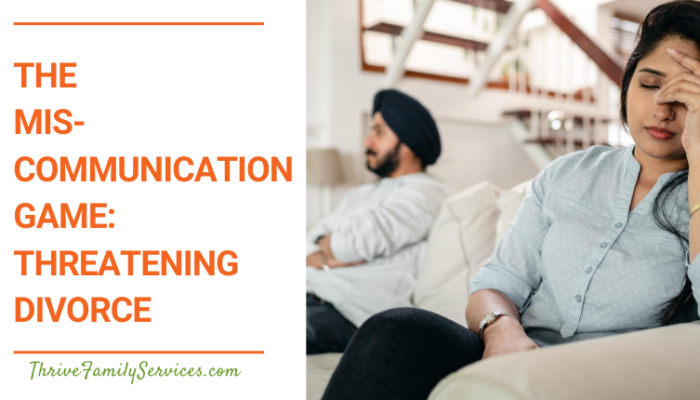What is a miscommunication game?
A miscommunication game is when someone says one thing but doesn’t share the true meaning of what they want to say. We see in couples therapy that miscommunication games make it difficult for partners to connect with each other because it leaves room for assumptions to be made. If one person says, “There’s a football game on Saturday…” when they are hoping that their partner will want to go to the football game with them, the other partner won’t know that when they give an answer, so they are answering an unspoken question.
It might go something like this:
Partner 1: “There’s a football game on Saturday…”
Partner 2: “Oh yeah?”
Partner 1: “Yeah, I love football games.”
Partner 2: “I don’t like how loud and dirty they are. I’d rather watch the game at home with my friends.”
On the other hand, if a miscommunication game wasn’t happening, the conversation could have gone like this:
Partner 1: “There’s a football game on Saturday…”
Partner 2: “Oh yeah?”
Partner 1: “Yeah, we should go together! I could really use a date night with you.”
Partner 2: “I would love a date night, too!”
When Partner 1 shared exactly what they were wanting and feeling, it allowed Partner 2 to have the chance to connect. In the first example, Partner 2 didn’t realize that their response was disconnecting because they didn’t know why Partner 1 was bringing up the fact that they love football.
It was a missed opportunity because a miscommunication game occurred.
As most people know, communication is more effective and connecting when we share our wants, thoughts, and feelings directly with the other. When partners avoid telling the other person these things but expect him or her to answer their unspoken question, disconnection and frustration can build up.
Sometimes, miscommunication games happen when one person feels too vulnerable saying what they are actually feeling. It can feel a lot safer to say something like “I don’t want to sit next to you” than saying, “You hurt my feelings, and I need you to comfort me.”
It can feel like a big risk to put your heart on the line, even with the people that we love.
That is why threatening divorce is the worst version of the miscommunication game.
In general, miscommunication games are dangerous because they can accidentally (or sometimes intentionally) create distance when what we really want is closeness and comfort. But when people threaten divorce or a break-up without meaning to, the miscommunication game can be really difficult to rein back in.
Imagine the person that you love telling you that they want to leave you… How do you think you’d react? Chances are, it might make you really anxious or it might make you want to withdraw. Either way, hearing the words, “Let’s just get a divorce” in an argument don’t leave a lot of hope that things will get better.
This can be even more confusing if the words “Maybe we should get divorced” are part of a miscommunication game.
Typically, this phrase is used when couples are feeling distant from one another. It can be used as a weapon or a shield instead of an honest wish. If you catch yourself using this phrase, it could be beneficial to assess why.
Maybe it’s one of these reasons:
1. “How I am feeling hurts, and I don’t know how else to make it stop other than a divorce. What I really want is for things to feel better between us.”
2. “You hurt me, so I am saying this to protect myself and get back at you. It doesn’t feel good to be in emotional pain, and I don’t know what else to do with it. I don’t actually want to hurt you. I just don’t want to be hurt by you, either.”
3. “If this doesn’t get better, then I want a divorce. I am not happy with the way our relationship is now. I so badly want things to get better, but I cannot keep living with this emotional pain. Let’s work on making things better instead of making things worse.”
4. “Conflict is scary, so if we can’t resolve this, there must be something wrong with us. I can feel the disconnection between us, and I don’t know how to make it better. Divorce crosses my mind because it’s the only way that I’ve seen other couples handle this. But it’s not actually what I want.”
If any of the above situations are true for you, these are things you can share with your partner that share your fears and needs. That way, you’re giving your partner a chance to address your fears and needs, rather than pushing them away with threats of leaving that you don’t actually want.
Even if you realize the real message behind communicating that you want a divorce, it can be difficult to find the vulnerability to share it! This is where a couples therapist can help. The more that partners are able to identify and share what they really need and feel, the more connection can grow. If you need help figuring out ways to improve your communication with your partner to avoid the miscommunication game, our Denver couples counselors can help.




